EU's Borrell Warns Tehran Over Its Behavior

Iran’s foreign minister says he has held a phone conversation with the EU foreign policy chief regarding mutual ties, the nuclear issue, and Ukraine developments.

Iran’s foreign minister says he has held a phone conversation with the EU foreign policy chief regarding mutual ties, the nuclear issue, and Ukraine developments.
Hossein Amir-Abdollahian said in a tweet Sunday night that during the conversation he has emphasized that “Iran relies upon its people and this was proven once again by the turnout on the anniversary of the Islamic Republic on February 11.
However, Josep Borrell said in a tweet that in his conversation with Amir-Abdollahian he once again underlined the EU's position on Iran's behavior.
He stated that he told the Iranian top diplomat that they must stop human rights violations, end support for Russia's war of aggression in Ukraine, and stop unjustified detention of EU citizens.
Last week, European Commission President Ursula von der Leyen said the bloc was contemplating a new package of sanctions against Moscow and its allies, including Tehran, over the Ukraine war.
Borrell also demanded that Iran fully cooperate with the UN nuclear watchdog, the IAEA. On Sunday, Bloomberg News quoted senior diplomats as saying that the UN watchdog, the International Atomic Energy Agency (IAEA) had recently detected uranium enriched to 84 percent while monitoring Iran’s nuclear facilities.
Earlier this month, Borrell warned that if Iran takes "a further step in its military assistance to Russia,” the nuclear agreement will be jeopardized.
However, he reiterated EU's commitment to continue efforts at ending the impasse in the nuclear negotiations despite friction between the Islamic Republic and the Western signatories of the deal.
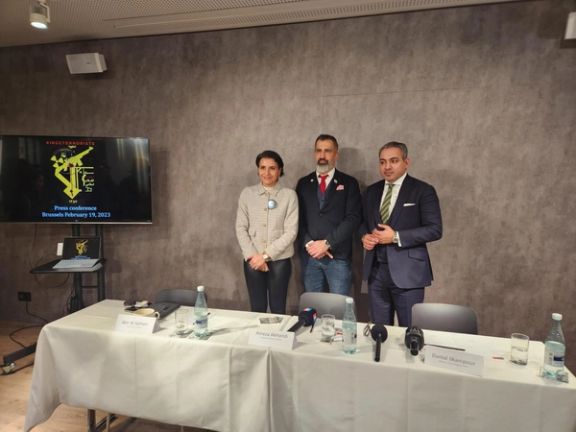
After a weekend of success for the Iranian opposition at the Munich Security Conference, dissidents are preparing a large rally in Brussels on Monday.
Prominent dissident figures spoke to Iranian expatriates as well as reporters on Sunday after the Munich Security Conference snubbed Tehran by not inviting regime officials this year.
A protest rally has been planned for Monday, February 20, outside the European Parliament in the Belgian capital Brussels to call on the European Union countries to designate the Revolutionary Guard (IRGC) as a terrorist organization. Thousands of Iranians from all over Europe held a massive rally in Strasbourg in January for the same purpose.
Speaking at an event on the eve of the Brussels demonstration a member of the Swedish parliament Alireza Akhondi expressed appreciation for the invitation extended to Prince Reza Pahlavi, and activists Masih Alinejad and Nazanin Boniadi to attend the Munich conference this year instead of Tehran regime officials.
Danial Ilkhanipour, a German-Iranian member of the Hamburg city parliament, and Iraqi-born Swedish Member of the European Parliament, Abir Al-Sahlani also spoke at the press conference. The three urged unity among the Iranian opposition, emphasizing that a united opposition can prompt the EU and countries around the world to put pressure on the clerical regime.
Iran International’s correspondent Mosaddeq Parsa said the gist of the event was to highlight the significance of designating the IRGC as a terrorist organization, which will further isolate the Islamic Republic and curb its destabilizing activities across the region and the world.
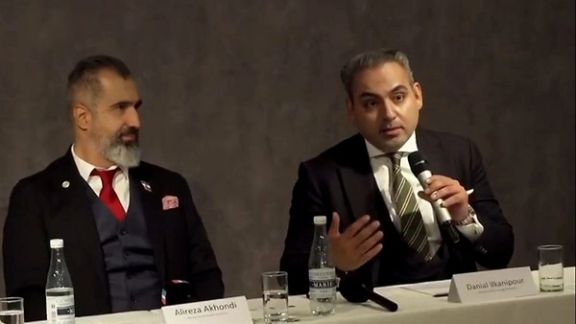
Akhondi touched upon the issue of regime threats against journalists at Iran International TV in London, which has caused the channel to temporarily relocate its studios to Washington DC. Akhondi that such threats are among the many reasons that European countries should list IRGC as a terror group.
"Declaring the Revolutionary Guards as terrorists is the finishing line of the Islamic Republic, that's why the intention of the Islamic Republic and the cyber army of the regime is to prevent our gatherings from growing bigger."
Al-Sahlani said that the IRGC is the cause of instability in the region and fuels military conflicts, adding that its designation by the European Union will lead to stability in the region. Everywhere in the Middle East where war, killing, repression and crime occur, traces of the Islamic Republic can be seen, she noted.
Earlier in the day, Alinejad appeared among the supporters of the exiled prince in Munich to reiterate solidarity of the Iranian opposition figures against the Islamic Republic. Pahlavi, who used to be seen as a solo actor determined to bring about the end of the Islamic Republic, has recently united with other top Iranian opposition figures with the same goal. Since a historic forum in Washington was held earlier this month, the dissident activists have been participating in events around the world to make the voice of the Iranian opposition heard. Such events signal the emergence of a leadership council in the diaspora to campaign for international support in favor of Iran’s protest movement.
According to Iran International’s correspondent in Munich, Ahmad Samadi, Alinejad also stressed the necessity of unity among all Iranians inside the country and abroad, regardless of differences to speed up the fall of the regime.
In an interview with Politico, Pahlavi called on the United States and Europe to help the Iranian people and the newly unified opposition exploit cracks in Iran’s leadership. Appreciating the sanctions already in place, he said that “The next level would be to target the Islamic Revolutionary Guard Corps to go after specific individuals and their assets abroad.”
“Frozen assets of the regime can be used, which is the Iranian people’s money. That money can be repurposed. We’re not asking for Germans to put money in the Iranian people’s pocket. It’s just a matter of making the decision to use the assets which are already there. I’m sure there should be some options of making exceptions to the sanctions to bring the money to the people, not to the dictator,” he added.
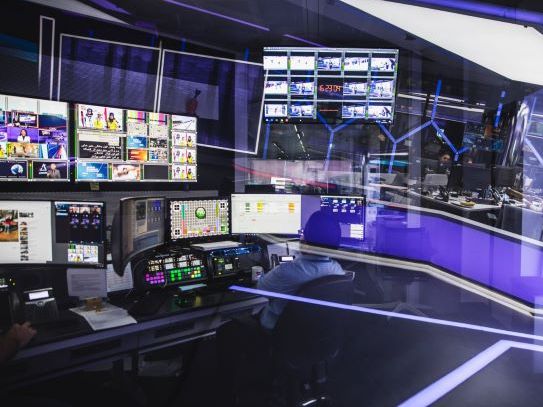
UK Security Minister Tom Tugendhat says the Iranian regime’s threats to assassinate UK-based journalists and harm their families are beyond contempt.
One day after Iran International announced that it is transferring its live broadcasting to its Washington DC office on the advice of the UK anti-terrorism police, Tugendhat expressed support for the network in a tweet Sunday evening.
“Their efforts to silence Iran International TV are a direct attack on our freedoms and an attempt to undermine our sovereignty. They will not succeed,” the minister said.
He went on to say that anti-terrorism police have given Iran International “exceptional support, including armed officers at their London studio.”
However, he explained that “Due to the severity of the threat they advised them to move to a more secure site in the UK. Until the new site's ready they'll broadcast from their US studio.”
He added that the network is determined to carry on its mission and “they won’t be silenced by cowardly threats from a despotic regime.”
London’s Metropolitan Police warned Iran International in November of plots originating with the Islamic Republic to kill or kidnap their journalists working at the network’s London headquarters at Chiswick Park.
Iranian officials who want to blame ongoing popular protests on foreign influences, accuse the network of instigating unrest and have directly threatened revenge.
“Their courage is important to defending freedom. We'll continue providing them with every form of support to ensure that they can continue their work in safety from the UK,” Tugendhat said.
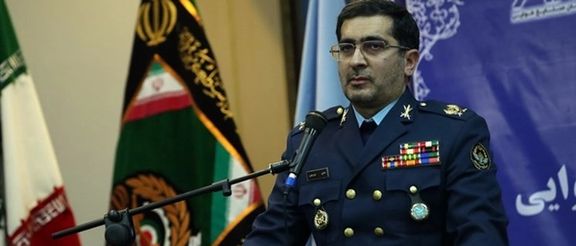
The Islamic Republic claims it does not need foreign-made parts from to produce military drones, despite many reports revealing the foreign origin of many parts of its UAVs.
Brigadier General Afshin Khajefard, the chief executive of the Iran Aviation Industries Organization (IAIO), said during a TV program on Saturday night that the country is self-sufficient in the production of drone and cruise missile engines.
"We have reached a level of self-sufficiency in the engine field that today we can produce 10 types of engines in the country, most of which are used on drones and cruise missiles," he said. “Of course, our defense industries have also reached self-sufficiency in designing and making heavy engines,” he noted.
He added that “We have various classes of missiles, precision-strike bombs, electronic warfare avionics and reconnaissance drones. However, we are trying to develop drones with civilian applications, because drones can be used for agriculture, mapping and firefighting."
He claimed that Iran is self-reliant in the field of overhauling commercial aircraft and manufacturing components in defiance of sanctions, adding that the Islamic Republic is also self-reliant in the building and overhaul of helicopters, and many of the country’s manufacturing is domestically made.
Iranian officials are known to make claims about military capabilities that cannot be independently verified.
Iran has developed a program of drones, or UAVs (unmanned aerial vehicles), given it lacks an effective air force due to international sanctions. While Iranian officials and commanders have celebrated this as an achievement of domestic production, Iran has often clandestinely acquired foreign-made parts.
Iran’s Shahed drones, in production since 2013, has been widely reported to have a Rotax 914 engine. A decade ago, there were reports that Iran had copied aspects of a US drone it had shot down.
Quebec-based Bombardier Recreational Products (BRP) expressed surprise that engines made by Rotax, its Austrian subsidiary, were reportedly found in Iranian-made drones shot down in Ukraine. The company’s logo has featured in photographs of drone wreckage. While Rotax engines are used in snowmobiles, watercraft and civilian airlines, they also figure in the United States MQ-1 Predator drone, Israel’s Heron drones, and some Russian drones. Drone output has surged in the Middle East in recent years, with the main producers Israel and Turkey.
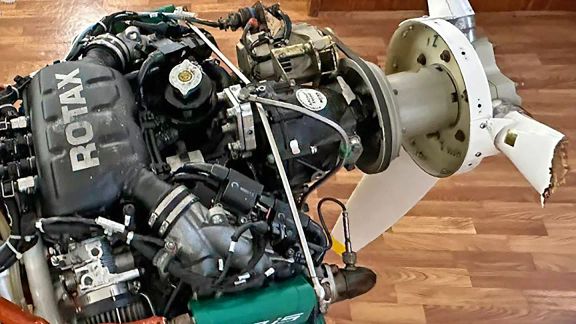
After a Rotax engine was apparently found in a Mohajar-6 drone shot down by Ukrainian forces and displayed on CNN in October, BRP stated October 21 it had not given authorization to distributors to “supply military UAV manufacturers in Iran or Russia.”
In January, the BRP, best known for water-skis and snowmobiles, said it has established through a “thorough investigation” set up three months ago that an engine found in a Mohajer-6 drone had not been sold directly to either Iran or Russia. Bombardier ended supplies of the engines to Iran in 2019, although the Mahtabal company in Tehran still markets itself as the official representative for Rotax engines. The date – 2019 – suggests this was a response to the United States 2018 introduction of ‘maximum pressure’ sanctions that threatened punitive action against third parties dealing with Iran. The engines, made primarily for recreational use, would not have been covered by a partial United Nations arms embargo on Iran that expired October in October 2020.
In early-February, dozens of US lawmakers wrote to President Joe Biden to express concerns about reports that Iranian-made drones recovered in Ukraine contain parts manufactured in the United States.
Later in the month, Axios quoted two EU officials as saying that the European Union is expected to impose sanctions on seven entities connected to the IRGC that the bloc believes are involved in the delivery of drones to Russia.
About the same time, the Biden administration expressed concerns about the support countries like Iran and North Korea provide to Russia to supply embargoed goods like microchips. Thea Candler, the Assistant Secretary of Commerce for Export Administration said, “Russia has turned to other countries, if you can imagine the partners of Iran and North Korea, to fill certain gaps in their purchases that have been created by the fact that our products are leaving the Russian market.” Moreover, the United Kingdom has submitted evidence to the UN showing that the IRGC is violating Security Council resolutions. Sources in Tehran told the Guardian last week that Iran used boats and a state-owned airline to smuggle new types of advanced long-range armed drones to Russia.
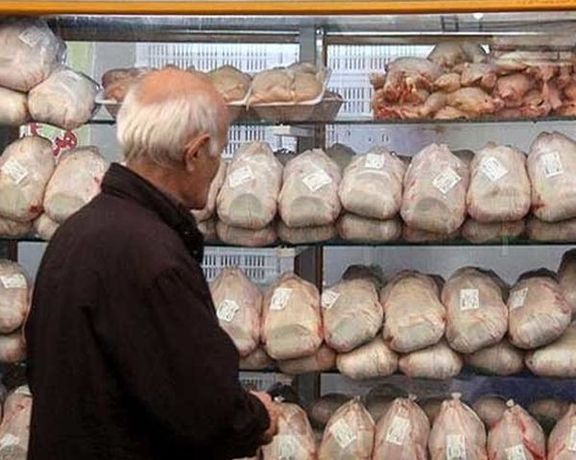
Amid reports about a sharp increase in food prices in Iran, officials say that over the past year demand for red meat has decreased by 50 percent.
Head of the Meat and Protein Industry Association of Iran, Masoud Rasouli told ILNA news website Sunday that "Compared to the last Iranian year [Ending in March 20, 2022], the demand for red meat has decreased by 50 percent while the demand for poultry also experienced a 30 percent fall."
Iran's currency rial on Sunday dropped to an all-time low of 490,000 to the US dollar.
Regarding fish, he said most is exported because of the drop in the value of national currency making exports more profitable, and little domestic demand for it.
Rasouli further noted that some of the meat production units in Iran have shut down, adding that "out of 700 meat packing companies, only 120 are active and 20% of them have closed down last year."
Iranian media report that the price of boneless mutton has reached 5,000,000 rials or 11 dollars per kilogram. Compared with the minimum monthly salary of 42,000,000 rials which is nearly $87 in today’s exchange rates, workers cannot afford any meat.
In recent years, various reports have been published about the increase in the price of all kinds of meat, and the decrease in the consumption of high-protein foods in Iran.
In this situation, the government of Ebrahim Raisi has promised to deliver meat and chicken to the people at an "approved price", but the government has made many similar promises in the past.
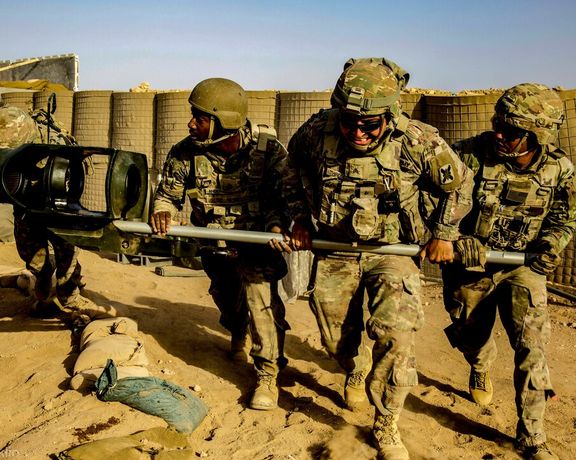
The US military's Central Command says a rocket attack has targeted coalition forces at the Green Village base in northeast Syria.
CENTCOM said in a statementSunday that no US or coalition troops were killed or wounded when two rockets hit the base, adding that there was no damage to the coalition infrastructure or equipment.
According to the statement, US forces are investigating the incident, but there are no claims of responsibility yet.
The Islamic Republic and its proxy militia groups that provide military support to Bashar al-Assad's regime in Syria are known for targeting US bases in Iraq and Syria.
Such attacks reached a crescendo in December 2019, before the United States decided to take out the commander of Iran’s extraterritorial Quds Force, Qasem Soleimani.
On January 3, 2020, the US military, on the order of President Donald Trump, killed Soleimani in a drone strike near Baghdad International Airport, saying that he had been "actively developing plans to attack American diplomats and service members in Iraq and throughout the region."
Several hundred American soldiers are stationed in the north and east of Syria as part of the international coalition against ISIS.
In recent years, the coalition bases have been sporadically targeted by rockets or drones.